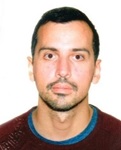Information on ADAGIO Fellows and Projects
Information on the successful candidates and their individual projects will be published here once the contracting procedures have been completed.
Information on the successful candidates and their individual projects will be published here once the contracting procedures have been completed.

Ricardo Arpad Pérez Camargo is a highly accomplished Materials Engineer with M.Sc. degree from Simón Bolívar University (USB) in Caracas, Venezuela. He later pursued a PhD. in Applied Chemistry and Polymers Materials at the University of the Basque Country (UPV/EHU) in San Sebastián, Spain. He was awarded the President’s International Fellowship Initiative (PIFI) in 2019 to perform his postdoctoral research at the Chinese Academy of Science (ICCAS) in Beijing, China. He continued his research in China with funding from the China Postdoctoral Science Foundation and the National Natural Science Foundation of China (NSFC) until 2023. His research focuses on the structure, morphology, and crystallization kinetics of different polymeric systems, including homopolymers, random copolymers, particularly isodimorphic, and blends. His work has resulted in the publication of over 40 articles in Q1 journals, which is a testament to the quality of his research. During his time at ICCAS, Ricardo's research was recognized with the prestigious Young Scientists of Institute of Chemistry Award from CAS in 2021. In 2023, he was awarded the Advanced Manufacturing Research Fellowship Programme in the Basque-New Aquitaine Region (ADAGIO). This MSCA COFUND Post-doctoral programme allowed him to return to UPV/EHU. His research will focus on combining his expertise in crystallization with an innovative processing technique, such as 3D-printing, to process semicrystalline polymers.
3D printing is a popular additive manufacturing technique that creates 3D-shaped solid objects quickly from computer-aided design models or 3D scans. The decreasing prices of additive manufacturing (AM) machines and advancements in modeling methods have further contributed to the growth of this technique. However, the range of polymeric materials available for 3D printing is currently limited to amorphous materials or those with low crystallinity. Semicrystalline materials offer better mechanical and thermal stability, but printing such materials requires exploration and understanding of how printing parameters affect their ultimate properties. The research work "3-D printing of poly (butylene succinate), PBS-based materials: Influence of the processing conditions on the ultimate properties and crystallization behavior" proposes a study of the printing process using materials based on PBS, a promising biodegradable material. The study includes pre-processing characterization and optimizing printing conditions, including using alternative thermal protocols like the self-nucleation protocol, to improve the properties of printed parts. The ultimate properties of the material, including degradation studies, will also be evaluated. Using PBS-based materials allows for exploring different degrees of crystallinity, which can address the issue of low interlayer adhesion commonly encountered in 3D printing. Establishing a relationship between material properties, processing conditions, and ultimate properties is expected. This knowledge will aid in developing promising materials like PBS and can be extrapolated to other materials, facilitating the printing of semicrystalline materials. The research aims to advance 3D printing as a primary processing technique for polymeric materials.